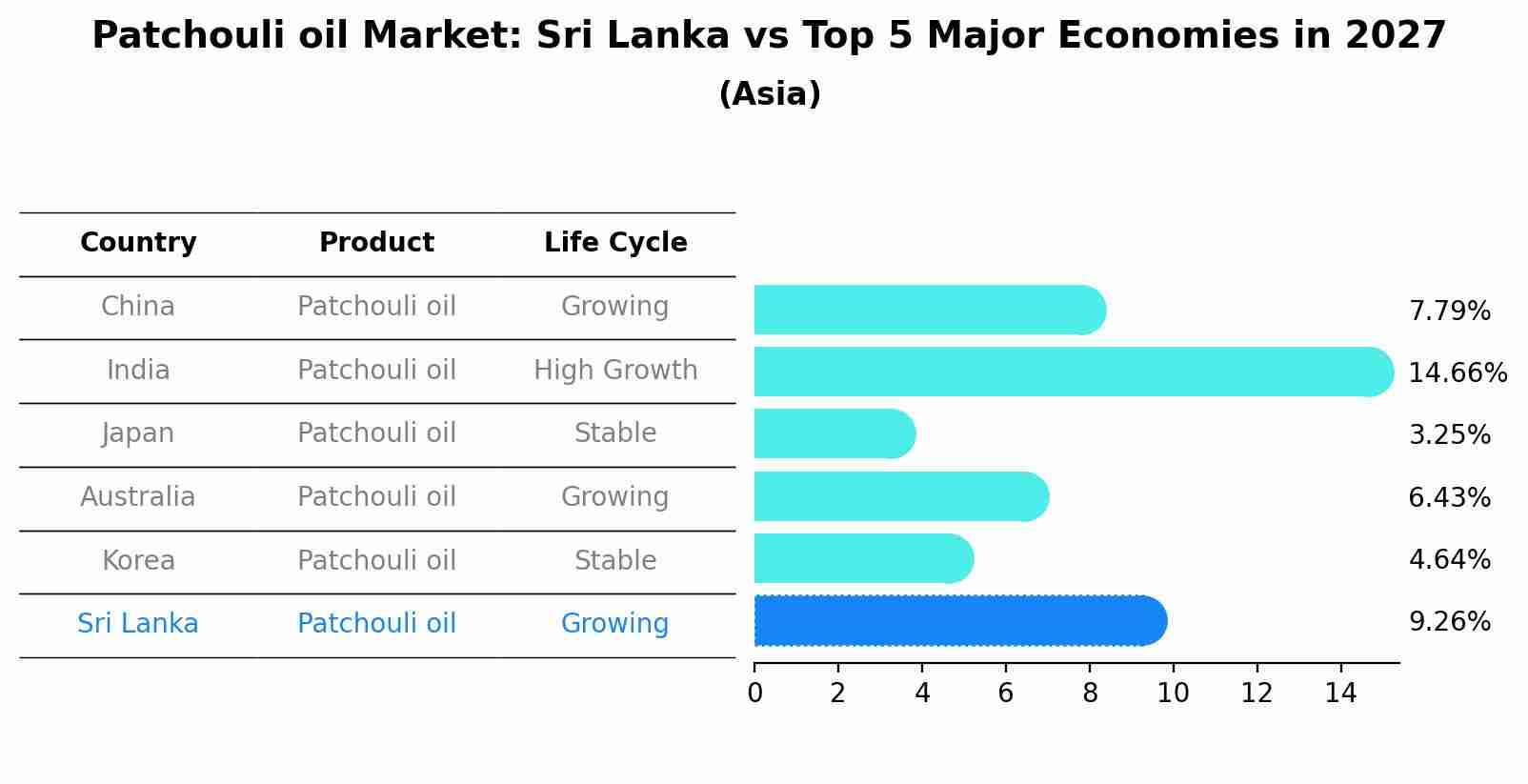Sri Lanka Patchouli oil Market Outlook | Trends, Forecast, Analysis, Companies, Share, Size, Value, Growth, Revenue, COVID-19 IMPACT & Industry
| Product Code: ETC093890 | Publication Date: Jun 2021 | Updated Date: Jun 2025 | Product Type: Report | |
| Publisher: 6Wresearch | Author: Shubham Padhi | No. of Pages: 70 | No. of Figures: 35 | No. of Tables: 5 |
Sri Lanka Patchouli oil Market Size Growth Rate
The Sri Lanka Patchouli oil Market is projected to witness mixed growth rate patterns during 2025 to 2029. Growth accelerates to 9.26% in 2027, following an initial rate of 7.17%, before easing to 4.46% at the end of the period.

Patchouli oil Market: Sri Lanka vs Top 5 Major Economies in 2027 (Asia)
By 2027, Sri Lanka's Patchouli oil market is forecasted to achieve a growing growth rate of 9.26%, with China leading the Asia region, followed by India, Japan, Australia and South Korea.

Sri Lanka Patchouli oil Market Overview
The Sri Lanka Patchouli oil market is experiencing steady growth driven by increasing demand for natural and organic ingredients in the beauty and personal care industry. Patchouli oil is valued for its unique fragrance and therapeutic properties, making it a popular ingredient in perfumes, cosmetics, and aromatherapy products. The country`s tropical climate provides an ideal environment for cultivating Patchouli plants, resulting in high-quality oil production. Sri Lanka`s reputation for sustainable farming practices further enhances the appeal of its Patchouli oil in the global market. Key players in the industry are focusing on enhancing production efficiency and expanding distribution networks to capitalize on the growing demand for Patchouli oil domestically and internationally.
Sri Lanka Patchouli oil Market Trends
The Sri Lanka Patchouli oil market is currently experiencing a growing demand due to the increasing popularity of natural and organic products in the beauty and personal care industry. Consumers are seeking out Patchouli oil for its earthy and exotic fragrance, as well as its reputed skincare benefits such as anti-inflammatory and anti-aging properties. The rise of aromatherapy and natural perfumery also contributes to the market growth, with Patchouli oil being a popular choice for its grounding and calming scent. The market is witnessing an expansion in product offerings, including Patchouli oil-based perfumes, skincare products, and essential oils. Additionally, sustainability and ethical sourcing practices are becoming more important to consumers, leading to a preference for Patchouli oil that is sourced responsibly and supports local communities in Sri Lanka.
Sri Lanka Patchouli oil Market Challenges
In the Sri Lankan Patchouli oil market, some of the key challenges faced include inconsistent quality due to variations in climate and growing conditions, limited awareness and understanding of the benefits of Patchouli oil among consumers, intense competition from other essential oils in the market, and the lack of standardized pricing mechanisms. Additionally, issues with supply chain management, including difficulties in sourcing high-quality raw materials and ensuring efficient distribution channels, pose challenges for stakeholders in the industry. Developing effective marketing strategies to educate consumers about the unique properties and uses of Patchouli oil, as well as improving quality control measures throughout the production process, are crucial steps to address these challenges and enhance the growth potential of the Sri Lankan Patchouli oil market.
Sri Lanka Patchouli oil Market Investment Opportunities
The Sri Lanka Patchouli oil market presents attractive investment opportunities due to the increasing global demand for natural essential oils in industries such as cosmetics, aromatherapy, and pharmaceuticals. With its unique earthy and musky scent, Patchouli oil is highly valued for its therapeutic properties and is often used in perfumes, lotions, and candles. Sri Lanka has a favorable climate for cultivating Patchouli plants, and the country`s rich biodiversity contributes to the high quality of the oil produced. Investing in Patchouli oil production and export in Sri Lanka could yield significant returns as the market continues to grow. Additionally, there is potential for value addition through organic certification and sustainable cultivation practices to meet the increasing consumer preference for eco-friendly products.
Sri Lanka Patchouli oil Market Government Policy
The Sri Lankan government has implemented various policies to support and regulate the Patchouli oil market in the country. These policies include initiatives to promote sustainable cultivation practices, provide financial support and incentives for Patchouli farmers, and establish quality control standards to ensure product authenticity and safety. Additionally, the government has introduced export promotion schemes to facilitate market access for local Patchouli oil producers and encourage international trade. Overall, these policies aim to boost the growth of the Patchouli oil industry in Sri Lanka, enhance product quality, and increase market competitiveness both domestically and globally.
Sri Lanka Patchouli oil Market Future Outlook
The future outlook for the Sri Lanka Patchouli oil market appears positive, driven by increasing demand for natural and organic products in various industries such as cosmetics, aromatherapy, and pharmaceuticals. Patchouli oil is known for its unique fragrance and therapeutic properties, making it a popular ingredient in a wide range of personal care and wellness products. Additionally, the rising trend towards sustainable and eco-friendly practices is expected to further boost the demand for Patchouli oil, as it is often sourced through ethical and environmentally friendly methods. With Sri Lanka being a key producer of high-quality Patchouli oil, the market is likely to see steady growth and opportunities for expansion in the coming years.
Key Highlights of the Report:
- Sri Lanka Patchouli oil Market Outlook
- Market Size of Sri Lanka Patchouli oil Market, 2021
- Forecast of Sri Lanka Patchouli oil Market, 2027
- Historical Data and Forecast of Sri Lanka Patchouli oil Revenues & Volume for the Period 2018 - 2027
- Sri Lanka Patchouli oil Market Trend Evolution
- Sri Lanka Patchouli oil Market Drivers and Challenges
- Sri Lanka Patchouli oil Price Trends
- Sri Lanka Patchouli oil Porter's Five Forces
- Sri Lanka Patchouli oil Industry Life Cycle
- Historical Data and Forecast of Sri Lanka Patchouli oil Market Revenues & Volume By Type for the Period 2018 - 2027
- Historical Data and Forecast of Sri Lanka Patchouli oil Market Revenues & Volume By Dark Patchouli Oil for the Period 2018 - 2027
- Historical Data and Forecast of Sri Lanka Patchouli oil Market Revenues & Volume By Light Patchouli Oil for the Period 2018 - 2027
- Historical Data and Forecast of Sri Lanka Patchouli oil Market Revenues & Volume By Application for the Period 2018 - 2027
- Historical Data and Forecast of Sri Lanka Patchouli oil Market Revenues & Volume By Perfumery for the Period 2018 - 2027
- Historical Data and Forecast of Sri Lanka Patchouli oil Market Revenues & Volume By Medicine for the Period 2018 - 2027
- Historical Data and Forecast of Sri Lanka Patchouli oil Market Revenues & Volume By Flavorings for the Period 2018 - 2027
- Historical Data and Forecast of Sri Lanka Patchouli oil Market Revenues & Volume By Others for the Period 2018 - 2027
- Sri Lanka Patchouli oil Import Export Trade Statistics
- Market Opportunity Assessment By Type
- Market Opportunity Assessment By Application
- Sri Lanka Patchouli oil Top Companies Market Share
- Sri Lanka Patchouli oil Competitive Benchmarking By Technical and Operational Parameters
- Sri Lanka Patchouli oil Company Profiles
- Sri Lanka Patchouli oil Key Strategic Recommendations
Frequently Asked Questions About the Market Study (FAQs):
- Single User License$ 1,995
- Department License$ 2,400
- Site License$ 3,120
- Global License$ 3,795
Search
Thought Leadership and Analyst Meet
Our Clients
Related Reports
- Afghanistan Rocking Chairs And Adirondack Chairs Market (2026-2032) | Size & Revenue, Competitive Landscape, Share, Segmentation, Industry, Value, Outlook, Analysis, Trends, Growth, Forecast, Companies
- Afghanistan Apparel Market (2026-2032) | Growth, Outlook, Industry, Segmentation, Forecast, Size, Companies, Trends, Value, Share, Analysis & Revenue
- Canada Oil and Gas Market (2026-2032) | Share, Segmentation, Value, Industry, Trends, Forecast, Analysis, Size & Revenue, Growth, Competitive Landscape, Outlook, Companies
- Germany Breakfast Food Market (2026-2032) | Industry, Share, Growth, Size, Companies, Value, Analysis, Revenue, Trends, Forecast & Outlook
- Australia Briquette Market (2025-2031) | Growth, Size, Revenue, Forecast, Analysis, Trends, Value, Share, Industry & Companies
- Vietnam System Integrator Market (2025-2031) | Size, Companies, Analysis, Industry, Value, Forecast, Growth, Trends, Revenue & Share
- ASEAN and Thailand Brain Health Supplements Market (2025-2031) | Strategy, Consumer Insights, Analysis, Investment Trends, Opportunities, Growth, Size, Share, Industry, Revenue, Segments, Value, Segmentation, Supply, Forecast, Restraints, Outlook, Competition, Drivers, Trends, Demand, Pricing Analysis, Competitive, Strategic Insights, Companies, Challenges
- ASEAN Bearings Market (2025-2031) | Strategy, Consumer Insights, Analysis, Investment Trends, Opportunities, Growth, Size, Share, Industry, Revenue, Segments, Value, Segmentation, Supply, Forecast, Restraints, Outlook, Competition, Drivers, Trends, Demand, Pricing Analysis, Competitive, Strategic Insights, Companies, Challenges
- Europe Flooring Market (2025-2031) | Outlook, Share, Industry, Trends, Forecast, Companies, Revenue, Size, Analysis, Growth & Value
- Saudi Arabia Manlift Market (2025-2031) | Outlook, Size, Growth, Trends, Companies, Industry, Revenue, Value, Share, Forecast & Analysis
Industry Events and Analyst Meet
Whitepaper
- Middle East & Africa Commercial Security Market Click here to view more.
- Middle East & Africa Fire Safety Systems & Equipment Market Click here to view more.
- GCC Drone Market Click here to view more.
- Middle East Lighting Fixture Market Click here to view more.
- GCC Physical & Perimeter Security Market Click here to view more.
6WResearch In News
- Doha a strategic location for EV manufacturing hub: IPA Qatar
- Demand for luxury TVs surging in the GCC, says Samsung
- Empowering Growth: The Thriving Journey of Bangladesh’s Cable Industry
- Demand for luxury TVs surging in the GCC, says Samsung
- Video call with a traditional healer? Once unthinkable, it’s now common in South Africa
- Intelligent Buildings To Smooth GCC’s Path To Net Zero


















